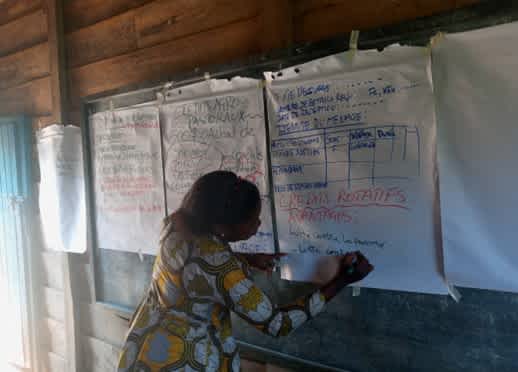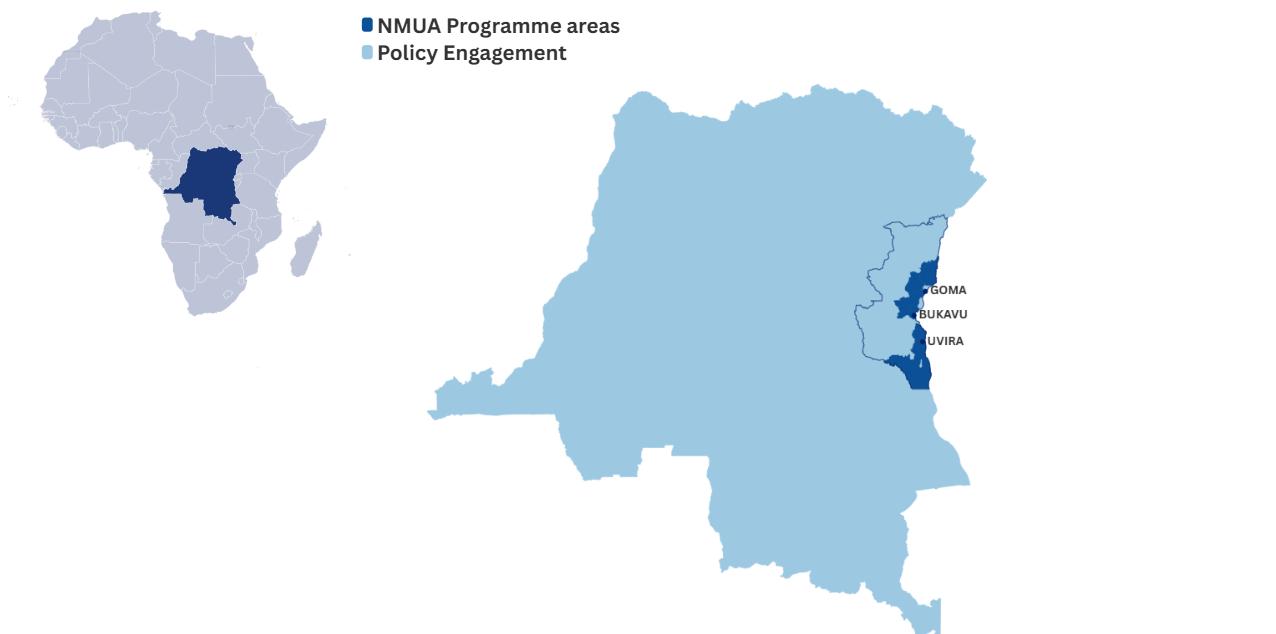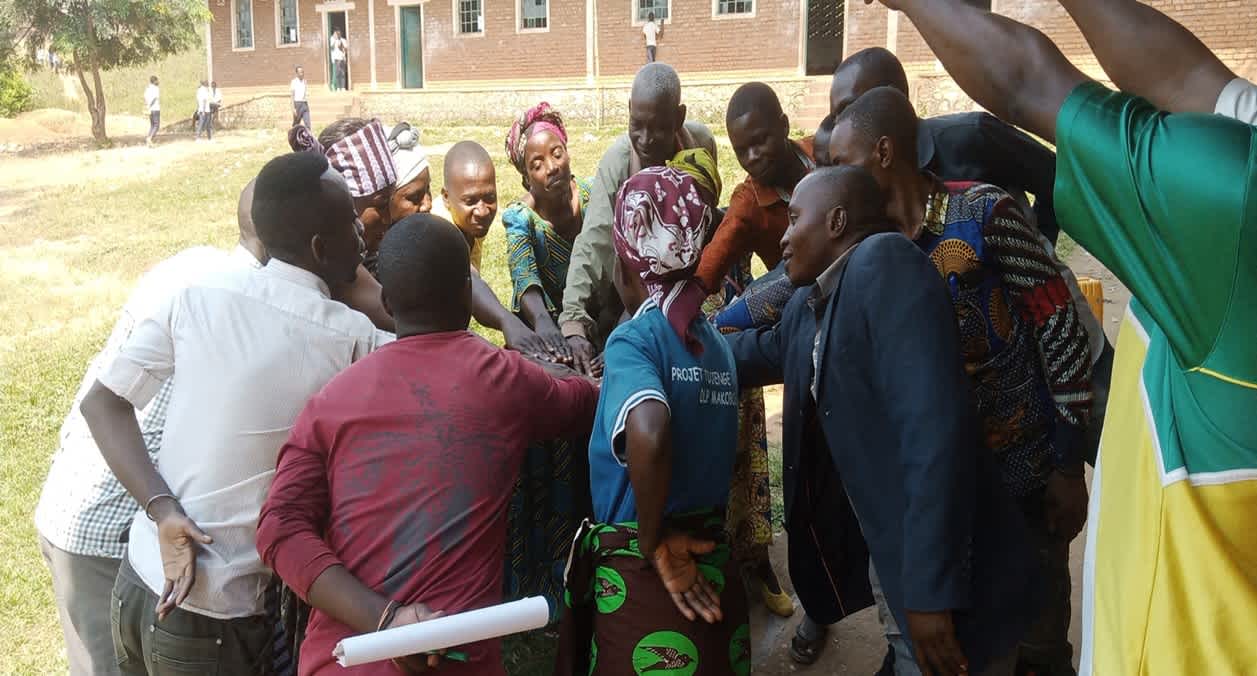Democratic Republic of the Congo
Our programme in the Democratic Republic of the Congo (DRC)
Building upon 20 years of experience carrying out peacebuilding initiatives in the DRC, LPI partners with Congolese peacebuilding civil society organisations to implement holistic, inclusive and innovative conflict transformation processes, which strive to address the root causes of conflict in the provinces of North and South Kivu. Most recently, LPI has stepped up efforts to promote meaningful engagement with state authorities and to further foster coordination and harmonisation between peacebuilding actors in the region – two key underlying conditions for sustainable change.
DRC, and specifically, eastern DRC, has been caught in a cycle of decades-long violence. The result of this long history of tensions and violence is a profound lack of trust between different communities, and between communities and political authorities. North and South Kivu, where LPI’s work focuses, continues to experience periodic clashes and military confrontations involving an ever-growing number of armed groups (including groups from neighbouring countries such as the RED-Tabara), and the Forces Armées de la République Démocratique de Congo (FARDC). An aggravating factor which perpetuates conflict is the competition for valuable natural resources, which involves armed groups, private citizens, and state actors in a web of relationships marred by violence, political manipulation and poor governance.
The conflict transformation processes LPI’s partners facilitate in North and South Kivu seek to address these deep-seated conflicts, by tackling three key underlying causes: land access, power disputes and identity.

Our work
Currently, LPI implements the “Innovative and Holistic Peacebuilding in eastern DRC – Namna Mpya ya Ujenzi wa Amani” (NMUA) programme, funded by the Swedish International Development Cooperation Agency (Sida). This programme was designed on the basis of a bottom-up collaborative evaluation process, coordinated by LPI in 2019-2020, which identified changes LPI-supported conflict transformation interventions had contributed to over the previous decade. The lessons learnt from this evaluation informed LPI and fellow peace organisations on how to improve peacebuilding policy and practice in the eastern DRC.
The NMUA programme aims to contribute to addressing the root causes of conflict in North Kivu and South Kivu by targeting four pillars of work, in alignment with LPI's strategic priorities:
Pillar 1: Community-level conflict transformation
In the contexts where we operate, we seek to place civil society organisations and existing capacities for peace at the core of our conflict transformation efforts. We seek to engage in formal partnerships with existing Civil Society Organisations (CSOs) and accompany them in conflict transformation processes by providing tailored technical and financial support. We work with CSOs that have a wealth of experience and expertise, a strong legitimacy, and access to key peace and conflict actors, and to the areas most affected by violence.
Pillar 2: Women and youth participation
Although women and youth often play a role in peace processes, this is rarely accompanied by increased access to decision-making spaces. In the eastern DRC, the impact of conflict on these groups and their active roles remain under-researched and hardly reflected in peacebuilding processes. Therefore, we seek to create spaces where women and youth can discuss, learn from each other, exchange and, above all, develop common actions to influence peacebuilding processes at the local and national level.
Pillar 3: Policy engagement for an environment conducive to peace
Policy engagement is a key strategy for delivering sustainable peace. Together with our partners, we seek to engage with authorities at various levels to: (1) Influence peace and security policies by giving voice to the perceptions, experiences and needs of people most affected by conflicts on the ground; (2) disseminate peace and security policies at the grassroots level; and (3) accompany and support authorities, including through capacity strengthening, in playing an active and constructive role in the implementation of peacebuilding and stabilisation efforts beyond formal policymaking processes.
Pillar 4: Collaboration and coordination between peacebuilding organisations
In collaboration with partners and the Community of Practice on Peacebuilding (CPP), we seek to enhance the accountability of peacebuilding organisations to conflict-affected communities, Congolese authorities, and donors. To do so, we strive to harmonise conflict transformation approaches and methodologies, to create opportunities for collaboration and joint learning, and to strengthen the compatibility and complementarity of peace interventions in the Eastern DRC.
Parallel to the NMUA programme, LPI has implemented a number of smaller-scale projects including a series of workshops for local partners on climate security and conflict in collaboration with the Folke Bernadotte Academy and a research project on security actors in the Uvira territory of South Kivu sponsored by the Swedish and Swiss embassies in the DRC.

Partners are key to our success
Partnership is a key tenet of our engagement in the DRC. For more than a decade, we have collaborated with Congolese CSOs. In 2021, ours and our partners' efforts culminated in the creation of a formal network of more than 50 peacebuilding organisations – the Community of Practice on Peacebuilding (CPP) – active across Ituri, North and South Kivu. As part of our current programme, we provide financial support to two partners (ADMR and SVH) and engage in knowledge partnerships through a collaborative learning process with 10 partners.
Current programme partners
Dynamique des Femmes Juristes (DFJ) Established on 11th September 2006 and based in Goma (North Kivu, DRC), DFJ is an NGO under Congolese law working for the protection, defence and promotion of women's and children's rights. Its vision is a society where human, moral and civic values are promoted without any discrimination and in the respect of human rights and the dignity of the woman, the child, and the family. DFJ strives to build a society where women are fulfilled, active and engaged in the improvement of their environment of life to exercise, defend and promote their rights.
Save Communities in Conflicts (SCC) SCC is a non-profit association established on 20th June 2010, with the objective of promoting sustainable peace for communities within a just and more harmonious society. The headquarters are in the city of Goma, North Kivu. SCC works to encourage a culture of peace through dialogue, with a focus on land-related conflicts. It works to empower and connect local communities in the fight against violence, especially sexual and gender-based violence, and to mitigate the effects of violent conflict. SCC also works to accompany the social, educational, and economic recovery of communities in support of peacebuilding efforts.
DFJ and SCC implement activities in the territories of Rutshuru and Masisi, North Kivu. LPI currently engages with them in a knowledge partnership and supports their policy engagement efforts.
Action pour le Développement des Milieux Ruraux (ADMR) ADMR is a non-profit association under Congolese law which was established in 1990, with headquarters in Bukavu. ADMR strives to contribute to the improvement of the living conditions of the rural and urban populations that it supports. ADMR's vision is to see the Congolese population live in a peaceful, united, just, and economically safe society. Under the NMUA programme, ADMR implements activities in the Uvira and Fizi territories.
Action pour le Développement et la Paix Endogènes (ADEPAE) Established in 1997 in response to a climate of mistrust and suspicion between communities in South Kivu, ADEPAE’s mission is to accompany the population in the positive transformation of conflicts and to promote good governance towards peace and sustainable development in the eastern DRC. Under the NMUA programme, ADEPAE focused on the Uvira and Fizi territories.
Reseau des Cadres de Concertation Intercommunautaire (RCCI) In Uvira and Fizi territories, platforms of inter-community collaboration were created as part of participatory action research (PAR) processes supported by the Réseau d’Innovation Organisationnelle (RIO) and by ADEPAE. These included the Cadre de Concertation Inter-Communitaire (CCI) in Bukavu, Uvira, Minembwe and Baraka. In 2016, the CCI structures evolved into the current network: the Réseau de Cadres de Concertations Inter-Communitaire (RCCI). 18 dialogue platforms, the Comités Mixtes de règlement des litiges (CM), were also established in rural areas to deal with disputes between farmers and herders at grassroots level.
Solidarité des Volontaires pour l'Humanité (SVH) SVH is a non-profit association under Congolese law. It was established on 20th May 2003 following the political turbulences in the territories of Fizi, Uvira and Mwenga in South Kivu caused by the bad governance of natural resources, social injustice, intercommunal tensions, presence of local and foreign armed groups, and massive human rights violations going unpunished Violence in these areas takes the form of sexual violence against women and girls, domestic violence, gender-based violence, ethnic violence, hate speech and discrimination, with the activities of armed groups resulting in killings, multiple displacements of civilians, looting of property and of civilians and widespread poverty. SVH contributes to the restoration of a climate of peace and peaceful cohabitation between communities, and to the strengthening of the rule of law with the purpose of endogenous, sustainable development.
LPI engages in knowledge partnerships and policy engagement with ADEPAE and RCCI, while it provides financial and technical support to SVH and ADMR.
Action pour la Paix et la Concorde (APC) APC is an NGO under Congolese law that focuses on conflict prevention and transformation, peacebuilding, good governance, human security, and the protection of civilians. APC's intervention approach combines PAR with the capacity strengthening of actors in conflict transformation techniques, dialogue, and negotiation. APC is currently working in 4 provinces of the DRC: South Kivu (where its headquarters are located), North Kivu, Kasai and Mai-Ndombe. For the last 10 years, APC has accompanied Congolese communities in conflict transformation processes.
Réseau des Associations Congolaises des Jeunes (RACOJ) RACOJ is a network of youth organisations in DRC that advocateswith communities and development actors for the participation of youth and women in developing innovative and effective initiatives that facilitate their access to a better life. The overall objective is to promote peace and the defence of human rights without discrimination.
Union Paysanne pour le Développement Intégral (UPDI) UPDI is a dynamic farmers' organisation established by small agricultural producers in rural South Kivu. Its vision is to become an economically strong farmers’ union, capable of defending the rights and interests of its members for the purpose of sustainable and integral development, and for the promotion of peace.
Service, Par, Pour et Avec les Femmes (SEPPAF) SEPPAF is a women's organisation that promotes the integral empowerment of women and girls in difficult situations for the sustainable development of their lives in South Kivu. It works to promote gender equality, peace, and security and to fight against the poverty that affects women through the socio-economic empowerment of girls and women.
RACOJ, UPDI, and SEPPAF operate respectively in the Kalehe, Kabare and Walungu territories of South Kivu, while APC works across all three territories. LPI engages with all of them in knowledge partnerships and on policy engagement.
Youth for Peace
Youth For Peace RDC is a network of 58 Congolese CSOs, member of the Community Peacebuilding in practice (CPP), working to promote youth initiatives with a view to their participation peace and security processes in the Democratic Republic of Congo and in the Great Lakes region. It carries out actions in the field that promote reconciliation and living together in communities torn apart by armed-by-armed conflict, communal strife and other forms of violence and injustice in the hope of achieving lasting peace. As such, its main actions are aimed at the integral development of young people's ability to live together, peaceful cohabitation and the consolidation of peace in the Great Lakes sub-region. Youth for Peace DRC works to implement the Youth, Peace and Security Agenda in DR Congo through awareness-raising, advocacy and capacity-building activities for young people and youth organization leaders on United Nations Security Council Resolution 2250 and other related resolutions.
YELI Burundi
YELI-Burundi (Youth Empowerment and Leadership Initiative) is a non-profit, youth-led initiative that empowers young people (young women and men) on issues that affect their lives forpositive change, peace and prosperity in Burundi. It offers opportunities to explore different leadership skills and develop their leadership potential. YELI Burundi has experience of working with young people and youth organizations in peacebuilding participation in decision-making bodies and economic development.
AJECL Rwanda
AJECL (Association des jeunes de Saint Charles Lwanga), is a non-gouvernemental organisation created in 2004 in Rwanda. Its aim is to empower young people to resist all forms of manipulation and exploitation, and to work by violent means for peace, violent means for peace, social cohesion, justice and progress for all. In Rwanda a special approach to promoting a culture of intra-intergenerational dialogue for social transformation for peace and sustainable development: Gwizamahoro program 2100: Dialogue Intra Intergenerational.AJECL creates savings and credit groups among low-income youth low-income youth and youth peace clubs in secondary schools and universities as a means of supporting young people in the peace-building process in Rwanda and the Great Lakes region.

Our donors
Donors and organisations who have recently supported LPI’s work in the DRC include: the Swedish International Development Cooperation Agency (Sida), The Swedish Mission Council (SMC), the German GIZ, the Folke Bernadotte Academy, and the Swiss Agency for Development and Cooperation.
Read more about LPI's donors on the funding & finance page.
Resources
More resources are available in the Publications & Reports page of our website and in our flagship publication: the Horn of Africa Bulletin.
Related articles & resourcesThe Democratic Republic of the Congo - Bukavu
LPI's DRC Programme is administered from the Office in Bukavu, DRC.
Postal Address
Life & Peace Institute, P O Box 64 Cyangugu/Rwanda
Visiting Address
12 Avenue Lundula, Q. Nyalukemba Ibanda, Bukavu, Democratic Republic of Congo
Phone +243 (0)815 684349, +243 (0)976 331585
Email info@life-peace.org
